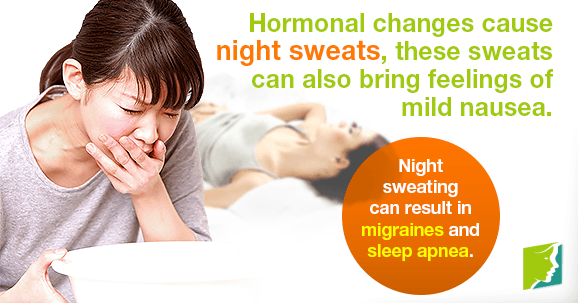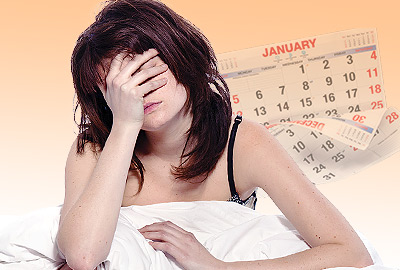"Night sweats" is the common term for nocturnal hyperhidrosis, an experience wherein the sufferer awakens to find themselves drenched in sweat. Uncomfortable, sleep-disturbing, and potentially unhygienic, hyperhidrosis can be symptomatic of many conditions, with some of which nausea is a shared symptom. Nausea is characterized by stomach pain and a feeling that vomiting is imminent. Keep reading to understand the links between nausea and night sweating, and learn what this combination of symptoms might suggest about your overall health.
Menopause, Night Sweats, and Nausea
As a woman approaches menopause, she is more prone to night sweats than she may have been during her previous adult life. This is because, in the years prior to menopause, hormonal changes in the body cause it to falsely detect increased body temperature - at what can seem like random moments - and react to cool down by producing sweat. By day, this is referred to as hot flashes; by night, it is known as night sweats. These sweats can also bring feelings of mild nausea.
When sweating regularly interrupts a woman's sleep cycle during menopause, night sweating can result in extreme tiredness. Feelings of nausea are often associated with tiredness, which creates a problematic cycle where in sweating, nausea, and exhaustion are inextricably linked.
Diet, Night Sweats, and Nausea
Dietary choices can also influence night sweating and gastrointestinal health. For example, consumption of alcohol, caffeine, and spicy food in the evening raise body temperature and make nocturnal sweating or nausea more likely.
Sweating and nausea are also symptomatic of low blood sugar and food poisoning. Low blood sugar means the body is not getting enough fuel; concentration and energy levels are likely to suffer as a result. Eating small meals often to avoid hunger can prevent this, or consuming around 15 grams of carbohydrates will efficiently refuel to restore lost sugar levels.
Food poisoning is contracted when food is contaminated with bacteria, (e.g., E. coli) or a virus (e.g., norovirus). As well as sweats and nausea, other symptoms include diarrhea and vomiting, and the effects of food poisoning could last for a few days.
Other Conditions
Stress is another condition in which night sweating and nausea are commonly experienced symptoms. Extreme anxiety causes the heart to pump more blood and oxygen, which may result in sweats and gastrointestinal discomfort, along with an inability to relax, difficulty in falling asleep, and chest pain. What's more, severe anxiety often leads to exhaustion - of which nausea and night sweats are both symptoms. If you are experiencing regular stress, it is advisable to consider your lifestyle or seek medical help; arrange an appointment with your doctor or a guidance counselor to discuss lifestyle adjustments to benefit your well-being.
Night sweating and nausea are also indicative of other conditions, including migraines, sleep apnea, and in more serious cases, certain types of cancer. If you are experiencing any other concerning or debilitating symptoms alongside sweats and nausea, immediately consult your doctor to arrange a medical examination.
Night sweats and nausea commonly go hand-in-hand as symptoms because they are symptomatic of one another; excessive sweating may be caused by nausea, and vice versa. The most common cause is the hormone changes your body endure while approaching menopause. Small lifestyle adjustments and natural supplements can be a great help to relieve night sweats and nausea. If sweating and nausea persist regularly or for longer than several days, it is worth consulting your doctor to discuss your options and rule out more serious health concerns.
Sources
- American College of Cardiology. (n.d). Diabetes: Low Blood Sugar. Retrieved February 7, 2014, from https://www.cardiosmart.org/~/media/Documents/Fact%20Sheets/en/zp3827.ashx
- National Health Service UK. (2013). Food Poisoning. Retrieved February 7, 2014, from http://www.nhs.uk/conditions/food-poisoning/Pages/Introduction.aspx
- National Health Service UK. (2012). Migraine and Symptoms. Retrieved February 7, 2014, from http://www.nhs.uk/Conditions/Migraine/Pages/Symptoms.aspx
- University of Michigan Health Service. (n.d). Anxiety Disorders and Panic Attacks. Retrieved February 7, 2014, from http://www.uhs.umich.edu/anxietypanic




